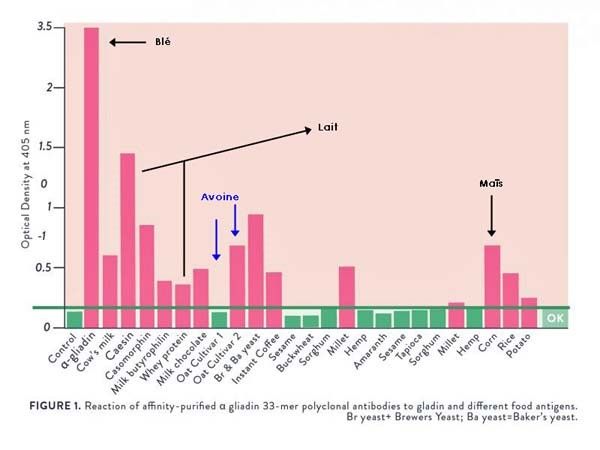Do we count gelatin/collagen protein towards total daily protein/macro?
-
Re: Do we count gelatin/collagen protein towards total daily protein/macro?
Short answer: yes if you have it with any of the following: meat/milk/dairy/eggs -
@LucH said in Do we count gelatin/collagen protein towards total daily protein/macro?:
a) casein induces an immune reaction, by everybody, even if you don't perceive it. The reaction is high by 50% people (cross-reaction with the agglutinin from whey).
b) collagen contains glycine and proline that are fragile. So, susceptible to be altered in the manufactured process.interesting, this would go against Ray Peat I believe. Do you think all Casein can cause an immune reaction, even those contained in a A2 dairy? do you have any study to reference?
I heard Ray Peat in a podcast saying the opposite on Gelatin actually, and being pretty safe. He was more concerned about the fragility of the process used to make whey protein.
-
After thinking a bit, this is my thought as now:
Even if gelatin is mixed with high biological value protein like animal protein, it still shouldn't be counted towards total daily protein goal, because it is poor in BCAA.
Then, for the sake of total daily calories counting and macro, yes it can, or maybe should be counted.
-
@GRay .. reading things like this on the old forum makes me think it can count (keeping in mind that best to get one s glycine etc from food (oxtail, shanks, wings and the like)):
Post in thread 'Glycine Is Directly Anabolic AND Anticatabolic For The Muscle'
https://lowtoxinforum.com/threads/glycine-is-directly-anabolic-and-anticatabolic-for-the-muscle.21353/post-318948“.. Peat said that 60%-70% of the daily protein can be form gelatin without creating any protein deficiencies or compromising tissue recovery or muscle growth.”
[- haidut] -
@GRay said in Do we count gelatin/collagen protein towards total daily protein/macro?:
Do you think all Casein can cause an immune reaction, even those contained in a A2 dairy? do you have any study to reference?
I heard Ray Peat in a podcast saying the opposite on Gelatin actually, and being pretty safe. He was more concerned about the fragility of the process used to make whey protein.
- A2 is easier to digest and give less problems.
See the book from Dr Jean-Marie Poinsignon:
« Rhumatismes : et si votre alimentation était coupable ? »
https://mirzoune-ciboulette.forumactif.org/t542-rhumatisme-et-si-votre-alimentation-etait-coupable?highlight=rhumatisme
- the book "Lait, mensonges et propagande" - nouvelle edition, Thierry Souccar, Henri Joyeux.
https://www.nutristore.fr/sans-gluten-et-sans-lait/lait-mensonges-et-propagande-nouvelle-edition-thierry-souccar-273
I can give a more developed theory to explain why an immune reaction, according to weakness of the ground ...
- Gelatin when well-processed is safe. RP spoke about contamination, I think.
If bought by a specialist, I'll trust it as safe.
See the figure (lait = milk = whey or casein)

- A2 is easier to digest and give less problems.
-
Thanks for attaching this. I think I might actually have seen this data many years ago, but did not remember at all.
It definitely opens my mind again on including collagen protein towards total daily count for protein.
Dr Mercola recommends 20 to 30 % of tot protein coming from collagen, perhaps this may be a good idea after all.
-
Not sure why you wouldn't count it unless you're running along that line of thought that FGF21 (which supposedly isn't suppressed by glycine) is important for metabolic health. Which I guess it is, but the debate seems to be is it good to activate or good to suppress. There seems to be well thought out arguments on both. Jay Feldman giving a pretty damning criticism of it. Of course, you got Anabology on X and the "emergence diet" guy (where I think the initial spark of this actually got popular at) endorsing it wholeheartedly.
For all the other reasons one might want to limit protein, like prioritizing glucose oxidation, lowering ACTH/cortisol, etc. I think counting gelatin in total protein consumption seems to make the most logical sense. It's not like not counting it is going to improve glucose retention of any kind. Basically all protein can powerfully drain liver glycogen if you eat it without sugar/carbohydrate. I would think evidence of glycine substantially increasing growth hormone is supportive of that.
-
@GRay Also, if it helps anyone, Ray Peat said about gelatin, “It’s important that it be very thoroughly dissolved for good digestion“ (ie eg downing a packet of dry gelatin powder in your mouth may not be the best idea):
Post in thread 'Ray Peat Email Advice Depository'
https://lowtoxinforum.com/threads/ray-peat-email-advice-depository.1035/post-875279“
Q: Hello Dr. PeatI was wondering where you stand with Gelatin supplementation…
…I've bought some high quality gelatin supplements…
Does it have downsides…do you have any advice on how..to take [it]?
…
RP: It has various therapeutic effects. It’s important that it be very thoroughly dissolved for good digestion.
“ -
This post is deleted! -
@16characterstwas thanks